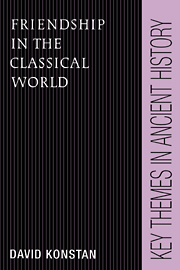3 - The Hellenistic world
Published online by Cambridge University Press: 14 January 2010
Summary
UNEQUAL FRIENDS
Among the epistles ascribed to the orator Isocrates is a letter of recommendation on behalf of a disciple of his named Diodotus (Ep. 4); the letter is addressed to Antipater, regent in Macedonia during Philip's absence. Assuming that the text is genuine and not a later composition passed off as classical – such exercises were fashionable in subsequent centuries – it may be dated to the year 340 or 339 BC. In the letter, Isocrates praises Diodotus for his moderation, thrift, and sense of justice, as well as for his pleasant nature and fluency (ligurōtatos), qualities that make him an excellent companion with whom to share the day or spend one's entire life. In addition to this, Isocrates says, Diodotus possesses parrhēsia or frankness in the highest degree – not an inappropriate outspokenness, but rather the kind of candor that manifests itself as the truest sign of good will toward his philoi. Isocrates continues:
Those princes who have a laudable gravity of soul honor this [frankness] as useful, whereas those whose nature is more feeble than the powers they possess take it ill, as though it compelled them to do what they do not choose; they do not realize that those who most dare to disagree concerning what is advantageous are the very ones who afford them the maximum capacity to do what they wish. For it stands to reason that monarchies, which involve many inevitable dangers, cannot endure in power by relying on those who elect always to speak with a view to pleasing; not even civic polities can do so, and they have more security. […]
- Type
- Chapter
- Information
- Friendship in the Classical World , pp. 93 - 121Publisher: Cambridge University PressPrint publication year: 1997



